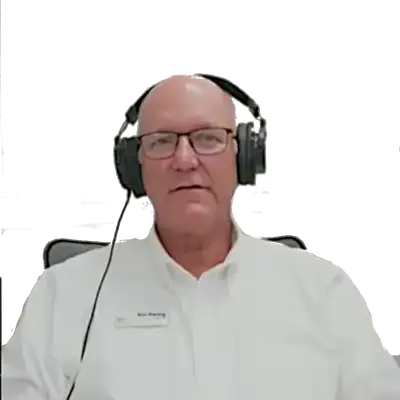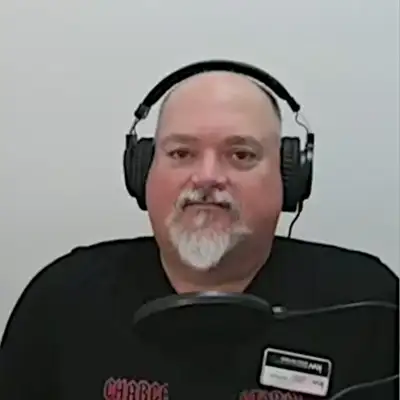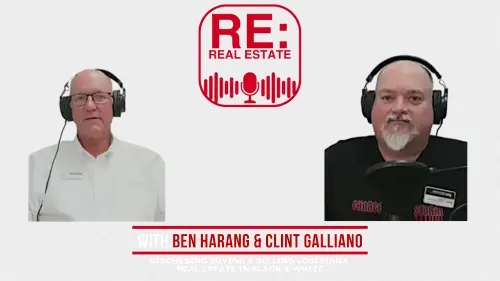Buyers: Find Your Home & Craft an Offer
Ben Harang (00:27)
Good afternoon, Clint. How are doing today?
Clint C. Galliano (00:30)
I'm doing wonderful, man. How you doing?
Ben Harang (00:32)
I'm doing terrific on this Friday afternoon after the July deep freeze. I'm sorry, January deep freeze we had a few days ago. We come in, we thaw it out.
Clint C. Galliano (00:46)
Yeah, we thawing it out. I wish we'd get water back.
Ben Harang (00:49)
That would be a good thing. Life is tough without running water.
Clint C. Galliano (00:55)
Indeed. I I grew up at some points without water, you know, because we lived in between civilization and Grand Isle and we were the only route for Grand Isle getting water. And so summertime, you know, it was constantly running out of water. So it was, you know, a constant battle until they ran some new water lines to Grand Isle.
Ben Harang (01:22)
Yeah, that's a tough one, but it seems to be coming back. So hopefully everything will be open back after this weekend.
Clint C. Galliano (01:32)
I sure hope so. My wife does too.
Ben Harang (01:35)
I'm sure, I'm sure she does. Okay, so what are we going to talk about in this buyer series?
Clint C. Galliano (01:43)
All right, today we are going to cover actually selecting a home, finding selecting a home, and crafting an offer once we've found a home that the buyer definitely wants to buy. We've kind of touched on portions of
of these when talking about these other parts of the buying process. So we're going to take a deep dive today into it.
Ben Harang (02:16)
Okay, kind of goes back to the buyer consultation we talked about initially, where, where we gather the information about what the clients must haves and would like to have items in a house and kind of keep them focused on, on the must haves. And hopefully we get a couple of the want, want to haves, included in it also.
Clint C. Galliano (02:44)
Yep, you know, sometimes we have to remind clients of that.
that I'm not going to say it's a rare thing that happens, but it happens more often than not where a client says, I'm looking for this and these are the exact strict guidelines that I have that I want to buy. And then they send me a house and says, they said, tell me, I want to go see this one. And they decide they fall in love with it. And it's nothing like they said they wanted, but all of a sudden they have to have it and wind up buying it.
Ben Harang (03:19)
Right. Well,
and, and, and our job is to kind of bring them back to reality and they can certainly change their mind, but kind of remind them about what, what they initially said they wanted and needed. And those things could change over time. but we just need to, we, we try to keep them focused on what they told us they wanted. And if it changes, then it changes, but it would not be good for them to go buy a house.
as an impromptu emotional decision and six months after they saw her, they bought the house.
Clint C. Galliano (03:55)
Yeah, I mean, this is, know, houses are long-term deals. Does you know good to buy a house and then three months later want to be selling it? You know, that's just a money losing proposition.
Ben Harang (04:11)
Right. Right. Okay. So now we've been through the process of actually finding the house. We've identified it. It's within the budget. it includes the, the budget includes the principal and interest and insurance and taxes. And we've talked about insurance, the significance of insurance and property taxes and the interest rates and all those things. But the budget is actually.
the principal interest insurance and taxes on a monthly basis. we've identified it. So now it's our job to craft an offer and the most favorable light to the seller to give it the best consideration that we can given the parameters we're working with with the buyer.
Clint C. Galliano (05:02)
Yeah, some of the first questions I ask when a buyer is ready to write an offer on a house is how much cash on hand do you have? And depending on the type of financing they're using, I'll give them an estimate of the maximum closing cost that they can expect. And they're not.
hard numbers. They're just guidelines on what they typically are and especially with the government loans, the maximum that the government will allow the sellers to pay on behalf of the buyers. But they're typically fairly close to, you know, a good way to estimate what the closing costs will be. And we try to
depending on how long the home's been on the market, how much cash the buyer has on hand. if they've got a good bit of cash on hand, then we can maybe ask for less closing assistance from the seller, if any at all. And then that gives us leeway as far as what the offer we can make as far as the price is concerned.
of this buyer needs to have all of the closing costs paid by the seller, then that increases the price that I would recommend that the offer be just because the seller doesn't want to see, know, again, it varies with properties, but they don't want to see a $15,000 below list price offer and then asking for another $10,000, $15,000 in closing assistance.
Ben Harang (06:55)
Right. If you're to ask for closing assistance, the offer should be significantly at the list price with the discount being the closing cost assistance or seller concessions as it's now known. It matters with the buyer's situation is like you said about how much cash they have on hand and how much cash they're willing to
put into the deal. because after you buy a house, you invariably have expenses. You want to kind of customize it to your likes and needs and you're to spend a few dollars on it, whether it's simply paint or changing some things around. So my suggestion to people is typically to save your cash if you can. And if they accept the offer, you're just rolling the closing costs into
the cost of the loan. It's a misnomer that the seller pays the closing cost. It's just the cost of the transaction and a function of the financing to allow the closing cost to be rolled into the loan.
Another thing to keep in mind is the actual closing date and how long it'll, it'll take to get a loan in place is typically somewhere 30 to 60 days, depending on the actual lender and the market and the time in the market. so be realistic on how long it will take to close. And sometimes the.
The seller is motivated to get out of the house. So quicker close works better. Sometimes they're not quite ready to get out of the house. So a 60 day close may be acceptable to them and make the offer more attractive than one that says they're going to close in two weeks. so we try to get a feel for what, what motivates the seller as well. So when we craft the offer, it gives the seller as much of what they want when we can give it to them.
so they can give it valuable consideration.
Clint C. Galliano (09:16)
Yeah, because if we're throwing things to the seller, you know, I'm not going to call it concessions, but you know, things that are attractive to the seller as part of the offer, then they're more likely to look on the offer favorably and be willing to accept it. You know, it's not an ego thing. It's not
I'm going to beat them down type of thing. It's, you know, ultimately we're trying to go for a win win and make everybody happy.
Ben Harang (09:54)
Mm-hmm.
Yeah, it's, you're much more likely to have the offer accepted the closer you are to the asking terms of the property. So if the seller feels like they're getting significantly what they want, they're more likely to accept it. If they feel like they're not getting what they want, then they're probably not going to accept the offer.
Clint C. Galliano (10:23)
And to be clear, that's just kind of a general approach for homes that are within the normal timeframe of days on market and stuff like that. If a property has just hit the market and your client wants to write an offer, then you need to get that offer out there fast and it needs to be the highest and best offer to ensure that the seller
accepts that offer before deciding to look at other offers. If it's been sitting on the market for six to 12 months, then you've got a little bit more negotiation room because the buyer is obviously wanting to sell it and hasn't sold yet. So they may be more likely to accept, you know, terms more favorable to the buyer just so they could get it sold.
Ben Harang (11:03)
No doubt.
And when a house comes on the market, you know, when you're having conversations with the buyer, buyer may feel like the house is overpriced and it may be, it may not be. But I tell them that, you know, if it's, if it's overpriced, it'll be here a while. If you're right, if you're wrong and it's not overpriced, it's not going to be here. Somebody else is going to buy it.
and you're going to lose out on the house. So if you want it, you need to take things like that into consideration. The sooner you make the offer on the house, like you said, with the days on the market, the better the offer has to be to be competitive. If you think it'll still be there in 90 days, then you wait 90 days and make an offer on the house. But chances are the house will be gone.
Clint C. Galliano (12:13)
Yeah, and once you do make the offer and it's accepted.
Buyers need to make sure that they don't add any extra debt. Don't go out and buy a bedroom set. Don't go buy a new car because that changes your debt to income ratio. If you're independently wealthy, then it really doesn't matter. But if your pre-approval or your approval for the loan is hinging on getting by the skin of your teeth,
to get that approval for the loan due to your finances, do not add any new financing to your credit report because that will kill the deal faster than a speeding bullet.
Ben Harang (13:06)
Yeah,
there's not a whole lot you can do about that. Also, one more suggestion. Don't quit your job the day before you buy the house. If you're to change jobs, buy the house and change jobs after you buy the house because they do verify employment the day of the closing. And if the employer cannot verify employment, the loan's not going to go through. that leaves everybody in a...
sour mood, buyers and sellers and lenders and attorneys and all those things. So just financially stay in the same position you're in when you got pre-approved until you actually close on the house. and unfortunately I'm speaking from experience on that one. had somebody do that. and the whole thing blew up in his face. So that's the,
Just keep it, keep it real, keep going to work. Just don't, don't get over anxious to do anything drastic until you close on the house.
Clint C. Galliano (14:18)
Yeah, we're here to advise. And like our disclaimer says, we're not your advisors unless we have paperwork saying so. you know, check with the agent before, know, whether it's us or somebody else, before you do anything that's drastic, check with your agent. Make sure that you're not doing a left turn or a U-turn in the process.
Ben Harang (14:39)
Yeah, in.
Well,
and, there's also stories, this has not happened to me, but there's stories of people excited about buying a new house. So they run out and furnish a new house on a credit card and spend 10 or $15,000 on furniture. Uh, cause there's 0 % interest for six months or something. And, um, they want to get the, they want to have the furniture when they close on house. And, um, that's a really bad idea.
Don't, don't do that. Wait till you buy the house and move your existing furniture in, and then you can buy whatever you want to buy after you buy the house.
Clint C. Galliano (15:27)
Yeah, because 10 and $15,000 of additional debt on your credit report, that does not look good.
Ben Harang (15:35)
Well, and if it fits within the debt to income ratio, you're fine. But you just need to ask some questions before you go off on a buying spree. Because you get excited about buying a house, it's fun, it's exciting, but don't go overboard. Buy it with some trepidation maybe.
until you actually close because anything can happen before the closing and if it doesn't close and you bought $15,000 worth of furniture you now have $15,000 worth of furniture and no house to put it in. So just have pragmatic actions and thoughts and not emotional.
Clint C. Galliano (16:21)
All right, so some of the other things that we take into consideration when we're crafting the offer is transfer of mineral rights. We have probably mentioned that before. At this point in time, it's not really a big deal. If the seller is getting any type of royalties from minerals being produced, then
they possibly want to retain it. You can negotiate for a portion of it if they don't want to give it all up. That's always an option. It's not that big of a deal. If there's no minerals being produced, then it's kind of not really a big deal on either side. Some other things would be, we typically always ask for a wood destroying insect report.
So that's basically a termite inspection. They go and look for active termite infestation. So that's one of the things that we do that on every transaction that I write an offer on because we're in South Louisiana and termites love to eat houses. Yeah, because we're wet.
Ben Harang (17:44)
because it stays wet. Now, another thought
on that is depending on whether the house is under a termite contract or not, is if it's under a termite contract, are you better off getting a WDIR, a wood destroying insect report from the company it's under contract with? Or do you want somebody else to go look at it independent of the contract to see if they see anything?
Because the older I get, the more I'll see a conflict of interest in those two things. When the company that has it under contract does the WDIR, it used to be unusual that a third party would do it. But there's a certain pest control company that refuses to issue WDIRs now. So if ours is under contract with them, we have to get a third party pest control company to look at it.
and that's kind of what I started thinking about the conflict of interest. It, it, really is, you're to send somebody in there that has a contract on a house to see if there's any, any termites that they're going to have to deal with if they find any. not saying anybody would overlook it, but they might. So it just, it just may be a prudent thing to think about.
Clint C. Galliano (19:02)
Yeah.
Yeah, so there's a few, and I can't really name them. I don't want to name any companies, but there's a few pest companies that they just, don't do the inspections and they outsource it or what have you. Now there's this one outfit out of New Orleans that...
Ben Harang (19:13)
Right.
Clint C. Galliano (19:32)
They've got maintenance and home inspections and all types of things bundled under this one umbrella. And one of the things that they do is the home inspector does the WDIR. But then if they do have issues, then they outsource it to the pest control division.
to, you if they don't have an existing provider, then they outsource it to them and vice versa. You know, and they apparently do a good bit of business because the one company that you did not name used these people to do their inspections and treatments sometimes because they're...
Ben Harang (20:18)
Yeah. Well, the company
I didn't name just flat refuses to issue anything. don't outsource anything. They just don't issue them.
Clint C. Galliano (20:25)
Well, I misspoke. The outsourcing is, say, if a home does have an infestation and needs to be tented, they outsource it to this company. Yeah, because they're like one of the only providers in the area that still does tenting
Ben Harang (20:35)
Okay, they'll outsource that. Okay.
Yeah. And, some of
the local inspectors also provide WDIRs for a fee. not all of them, but some of them do. that's, that's just another option to where you don't automatically necessarily go to the company that has the house under contract.
Clint C. Galliano (21:04)
Yeah. Let's see. What's some other things? Typically,
Ben Harang (21:09)
We talked about what about,
I'm sorry. Let's talk about the inspection period, which is something else we need to, come up with is how long do you have to do the due diligence to be convinced that you want to buy the house? we, we did hit on this in a, in a previous podcast, but it's, like a two week inspection period. There are some people think that's too long and it's not so we.
Clint C. Galliano (21:14)
Okay.
Ben Harang (21:40)
Take two weeks to do it. It's anything can happen. and coming off the, the winter storm we just had where we lost four days and today is really a fifth day that we're going to lose. if something happens, then you, you're asking for an extension of the inspection period. You can generally get it done in a week, but you also have to get it done, receive the report, digest it.
And then do any follow up inspections. If the inspector calls for an HVAC or electrical or plumbing inspection or roof inspection, then you need to the time to, set that up. so it's, rather not box anybody into a corner buyer or seller. so I'd rather give them time, let them look at it, let them understand what's going on so they can make an informed, educated decision and not a decision under pressure.
Clint C. Galliano (22:40)
And then seems like the last couple of buyers I've worked with, they decide on the weekend to write an offer and the inspectors, either the inspector or myself is tied up and so we wind up not doing the inspection until the following Monday. You know, so like almost a week later. you know.
Ben Harang (22:59)
Mm-hmm.
Clint C. Galliano (23:05)
I do two weeks also and for the same reasons, just in case there needs to be any deeper inspection done prior to submitting the response. Because that's what that due diligence and inspection period is for, for how long you have to submit your response.
Ben Harang (23:15)
Mm-hmm.
And another thing to look at when you craft any offer is the actual closing date. And we hit on this earlier, but get a calendar out and see about a holiday. We have Mardi Gras coming up. It's about 45 days away. And if you just pick a date, you might pick Tuesday of Mardi Gras and that's not going to happen. And probably Monday or Lundi Gras the day before Mardi Gras is not going to happen.
And people are hung over on the day after Mardi Gras on Ash Wednesday. So just look at it. You can't see everything that's going to happen, but you can not have a closing date. That's a Saturday or Sunday or a holiday. so just be mindful of that when you pick the, the date. and one last thing, I think Clint might be a deposit on the offer.
you know.
Clint C. Galliano (24:25)
Yeah,
we talked a little bit about that. We talked a good bit about it in the GFD and Title Companies episode.
Ben Harang (24:32)
Yeah, we did.
Okay. That's just one way to, another way to make, make the offer more attractive to a seller, by the size of the deposit, which is generally refundable. So I don't know. I don't know how long we're going Clint, but I think we, pretty much covered it.
Clint C. Galliano (24:35)
So but.
Yep. Yeah, then.
Yeah, we've covered a good bit. The only other thing I was going to say is that I'll typically put a closing date for the middle of the week because it seems like everybody wants to close on Mondays or Fridays.
And then I have things going on on Tuesdays and Thursdays. And so I said, try to set all of my contracts to close on Wednesdays because that seems to be the least busy, busiest day of the week for title companies. So just little things behind that.
Ben Harang (25:27)
And I'll also
the further away you can get from the end of the month, the better off you're going to be. If, you're to close on Friday, the last business day of the month, have pretty good chance of not being able to close that somebody might, might get bumped. whether it's the underwriter, they can get to it. The attorney can't get to it. Somebody, if there's a hiccup or somebody has a hangnail, it's not going to close where if you.
You close on the 27th and it's a Tuesday or Wednesday, you have a real good chance of closing that week before the end of the month. So that's just some tried and true and come from experience suggestions on how to come up with a closing date.
Clint C. Galliano (26:17)
I we've definitely covered selecting a home and buying or crafting the offer. So just want to remind everybody to subscribe to the podcast on your favorite app. Like these apps. You can watch us on YouTube also if you're watching this and you're just listening to it. If you are,
watching it. Give us a like, subscribe to the podcast there, and leave us a comment. Tell us what you like, ask any questions, and share it with your friends.
Ben Harang (26:58)
And in comment in the comment section or email us and and we'll take your topics and comments and turn them into a future podcast. All right, Clint, have a good weekend. I hope your water comes back on soon and life gets back to normal. Have a good one.
Clint C. Galliano (27:09)
you
You too, Ben
Ben Harang (27:16)
Thanks.
All right.
Creators and Guests



